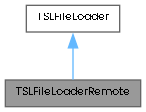 |
MapLink Pro 11.2
Envitia MapLink Pro: The Ultimate Mapping Application Toolkit
|
 |
MapLink Pro 11.2
Envitia MapLink Pro: The Ultimate Mapping Application Toolkit
|

A loader that can load remote files, which are those in paths starting with http://, ftp:// or https://
Can also decompress files (either remote or local).
Can be used asynchronously (multi-threaded with callbacks) or synchronously (return when finished).
Public Member Functions | |
| TSLFileLoaderRemote (unsigned int maximumConcurrentRequests=1) | |
| bool | addCredentials (const char *username, const char *password, const char *address) |
| bool | allowInvalidSSLCertDomain () const |
| void | allowInvalidSSLCertDomain (bool value) |
| bool | allowUnknownSSLAuthorities () const |
| void | allowUnknownSSLAuthorities (bool value) |
| void | clearCachedCredentials () |
| bool | enableContentCompression () const |
| void | enableContentCompression (bool value) |
| TSLLoaderStatus | loadPOST (const char *addressURL, const char *mimeType, unsigned char *buffer, unsigned int lengthOfBuffer, TSLLoaderCallback callback, void *arg, bool synchronous=true) |
| void | maximumConcurrentRequests (unsigned int maximumConcurrentRequests) |
| unsigned int | maximumConcurrentRequests () const |
| void | remoteAuthenticationCallback (TSLRemoteAuthenticationCallback *callback) |
| TSLLoaderStatus | loadGET (const char *addressURL, TSLLoaderCallback callback, void *arg, bool synchronous=true) |
| bool | addCertificates (const char *certificatePath, const char *address) |
| void | clearCachedCertificates () |
| void * | operator new (size_t size) TSL_NO_THROW |
| void * | operator new (size_t size, char *filename, int line) |
 Public Member Functions inherited from TSLFileLoader Public Member Functions inherited from TSLFileLoader | |
| void | cancelAllLoads () |
| void | destroy () |
| bool | fileExists (const char *filename) |
| bool | fileModificationTime (TSLPathList *pathList, const char *filename, TSLTimeType &lastModificationTime) |
| bool | findMatchingFile (TSLPathList *pathList, const char *filename, TSLSimpleString &fullPathFound, TSLMaplCompressionOption *compression=0, bool *remote=0) |
| TSLLoaderStatus | load (TSLPathList *pathList, const char *filename, TSLLoaderCallback callback, void *arg, bool synchronous=true) |
| TSLLoaderStatus | loadImmediate (TSLPathList *pathList, const char *filename, TSLifstream *stream) |
| TSLLoaderStatus | loadSegment (TSLPathList *pathList, const char *filename, TSLFileOffset offset, TSLFileLength length, TSLLoaderCallback callback, void *arg, bool synchronous=true) |
| TSLLoaderStatus | loadSegmentImmediate (TSLPathList *pathList, const char *filename, TSLFileOffset offset, TSLFileLength length, TSLifstream *stream) |
| void | setCallback (TSLLoaderFileCallback callback, void *userData, int loaderCallbacks) |
| TSLFileLoaderTypeEnum | type () const |
Additional Inherited Members | |
 Protected Member Functions inherited from TSLFileLoader Protected Member Functions inherited from TSLFileLoader | |
| TSLFileLoader () | |
| ~TSLFileLoader () | |
| TSLFileLoaderRemote::TSLFileLoaderRemote | ( | unsigned int | maximumConcurrentRequests = 1 | ) |
Constructor
| maximumConcurrentRequests | The maximum number of requests for an instance of the TSLFileLoaderRemote class to handle. |
| bool TSLFileLoaderRemote::addCertificates | ( | const char * | certificatePath, |
| const char * | address ) |
Add a certificate to the cache. The supplied certificate will be attached to all requests sent to the supplied address.
If the address already exists in the cache, the certificate will be replaced.
| certificatePath | the file path to the .cer file |
| address | the url address the certificate is to be used for |
| bool TSLFileLoaderRemote::addCredentials | ( | const char * | username, |
| const char * | password, | ||
| const char * | address ) |
Add a set of credentials to the cache. The supplied username and password will be used for all addresses which begin with the supplied address.
If the address already exists in the cache, the credentials will be replaced.
| username | The username for the address. |
| password | The password for the address. |
| address | The address to set the credentials for. |
| bool TSLFileLoaderRemote::allowInvalidSSLCertDomain | ( | ) | const |
Queries whether to allow SSL certificates that do not correspond to the domain name being accessed.
When connecting to remote servers using SSL, by enabling this flag the loader will not fail due to the server's certificate not corresponding to the domain name being accessed. By default this flag is set to false.
| void TSLFileLoaderRemote::allowInvalidSSLCertDomain | ( | bool | value | ) |
Sets whether to allow SSL certificates that do not correspond to the domain name being accessed.
When connecting to remote servers using SSL, by enabling this flag the loader will not fail due to the server's certificate not corresponding to the domain name being accessed. By default this flag is set to false.
| bool TSLFileLoaderRemote::allowUnknownSSLAuthorities | ( | ) | const |
Queries whether to allow SSL certificates to be issued by an unknown authority.
When connecting to remote servers using SSL, by enabling this flag the loader will not fail due to the server's certificate being issued from an untrusted signing authority. By default this flag is set to false.
| void TSLFileLoaderRemote::allowUnknownSSLAuthorities | ( | bool | value | ) |
Set whether to allow SSL certificates to be issued by an unknown authority.
When connecting to remote servers using SSL, by enabling this flag the loader will not fail due to the server's certificate being issued from an untrusted signing authority. By default this flag is set to false.
| void TSLFileLoaderRemote::clearCachedCertificates | ( | ) |
Deletes all credentials from the cache.
| void TSLFileLoaderRemote::clearCachedCredentials | ( | ) |
Deletes all credentials from the cache.
| bool TSLFileLoaderRemote::enableContentCompression | ( | ) | const |
Queries whether requests should include the "Accept-Encoding" header with a value of "gzip". Assuming the server supports this, the response will be sent back compressed, thus reducing network traffic. This does have the draw back that additional processing is required at both the server and client however.
By default this flag is set to false.
| void TSLFileLoaderRemote::enableContentCompression | ( | bool | value | ) |
Sets whether requests should include the "Accept-Encoding" header with a value of "gzip". Assuming the server supports this, the response will be sent back compressed, thus reducing network traffic. This does have the draw back that additional processing is required at both the server and client however.
By default this flag is set to false.
| TSLLoaderStatus TSLFileLoaderRemote::loadGET | ( | const char * | addressURL, |
| TSLLoaderCallback | callback, | ||
| void * | arg, | ||
| bool | synchronous = true ) |
Performs an HTTP GET request to the URL provided. An optional buffer may be provided that contains this content.
The request will be made synchronously.
If successful, the body of the response is returned in a stream as part of the callback function.
| addressURL | The address of the target of the request |
| callback | Function to call when the operation has been completed successfully. The server response will be passed in the form of a TSLifstream to the function. |
| arg | Argument passed to callback function, user-defined. |
| synchronous | Reserved for future use. |
If the operation is successful, a call will be made to the passed callback and the value TSLLoadingOK will be returned. Otherwise a status code denoting the reason for failure will be returned.
| TSLLoaderStatus TSLFileLoaderRemote::loadPOST | ( | const char * | addressURL, |
| const char * | mimeType, | ||
| unsigned char * | buffer, | ||
| unsigned int | lengthOfBuffer, | ||
| TSLLoaderCallback | callback, | ||
| void * | arg, | ||
| bool | synchronous = true ) |
Performs an HTTP POST request to the URL provided. A mime type should be provided to denote the format of the content of the request, while an optional buffer may be provided that contains this content.
The request will be made synchronously.
If successful, the body of the response is returned in a stream as part of the callback function.
| addressURL | The address of the target of the request |
| mimeType | The format of the content of the request |
| buffer | The content of the request. If this parameter is null then the request will be made with no content. |
| lengthOfBuffer | The length of the buffer passed in the buffer parameter |
| callback | Function to call when the operation has been completed successfully. The server response will be passed in the form of a TSLifstream to the function. |
| arg | Argument passed to callback function, user-defined. |
| synchronous | Reserved for future use. |
If the operation is successful, a call will be made to the passed callback and the value TSLLoadingOK will be returned. Otherwise a status code denoting the reason for failure will be returned.
| unsigned int TSLFileLoaderRemote::maximumConcurrentRequests | ( | ) | const |
Returns the number of maximum concurrent requests for an instance of this class.
| void TSLFileLoaderRemote::maximumConcurrentRequests | ( | unsigned int | maximumConcurrentRequests | ) |
Sets the number of maximum concurrent requests for an instance of this class.
| maximumConcurrentRequests | The maximum number of requests for an instance of the TSLFileLoaderRemote class to handle. |
| void * TSLFileLoaderRemote::operator new | ( | size_t | size | ) |
Overridden allocation to redirect to MapLink
| void * TSLFileLoaderRemote::operator new | ( | size_t | size, |
| char * | filename, | ||
| int | line ) |
When included in an MFC application in debug mode, the debug new expects this to be here. Override it and return the same as the normal one. The library must include it when compiled in release mode, since the user's application may be in debug mode.
| void TSLFileLoaderRemote::remoteAuthenticationCallback | ( | TSLRemoteAuthenticationCallback * | callback | ) |
Sets the TSLRemoteAuthenticationCallback used when server credentials are required.
The callback will be called any time the loader encounters the http 401 (unauthorised) response.
MapLink does not automatically cache the returned credentials, please use the addCredentials method if they need to be cached for further requests.
Pass NULL as the parameter to clear the callback.
| callback | The TSLRemoteAuthenticationCallback instance to use. |